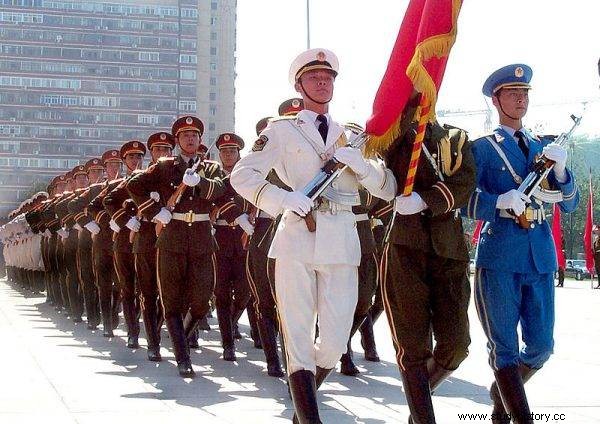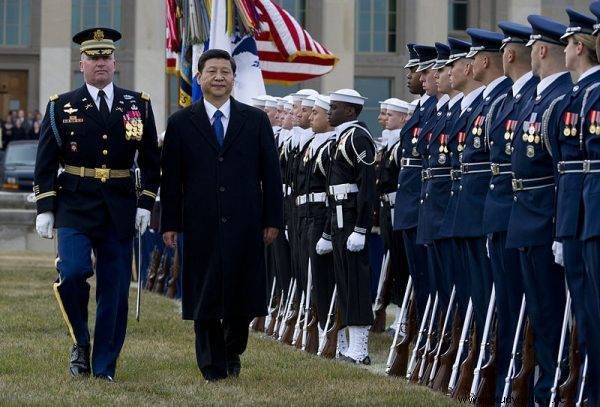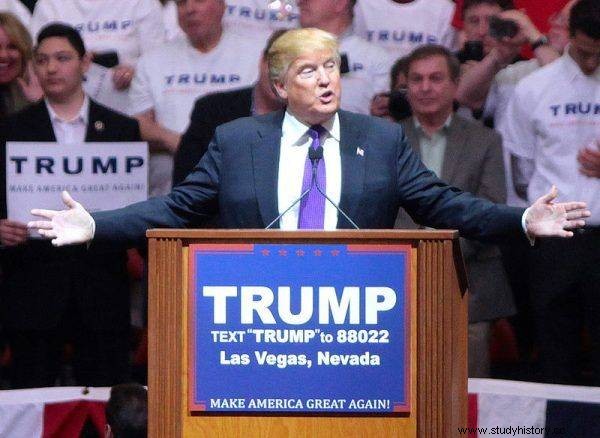According to experts, soon two powers with enormous resources and large armies will face each other. When and where will World War III start?
Piotr Zychowicz : When and where will World War III break out?
Jacek Bartosiak :It has already exploded. Although the word "exploded" is not entirely precise. (…) Until recently, the United States guaranteed the world order. Their role in Eurasia, however, is now being questioned by China and Russia.
PZ : It seems that World War III, at least in its first phase, will be far from our borders. Asia, the Pacific region will be a flashpoint. (...) In reality, however, it is about competition between great powers. The key is the balance of power America is trying to be the guardian.
Whenever a power appears that aspires to the role of a local hegemon, that is, threatens the balance of power in Eurasia, America tries to contain it and then destroy it. Four examples:Wilhelmina Germany during World War I, the Third Reich, the Empire of Japan and the Soviet Union. (...) Now China is a contender for local, and perhaps global, hegemony. Are they stronger or weaker than their predecessors (...)?

China is the strongest state in history that aspires to overthrow America's hegemony.
JB :China is the strongest state in history aspiring to overthrow America's hegemony. (...) previously there were four and a half such attempts. In the 1980s, Japan was economically dependent on the United States in terms of security, but it also found itself on this trajectory. Americans seriously feared that it would dominate the Pacific region (...). They forced Tokyo, in an agreement signed in 1985 at the New York Plaza Hotel, to change the macroeconomic parameters of the economy (...).
This is the power in the international system that the Americans wield and the Chinese are trying to take them away. The war is already going on. It is a war for strategic flows. China is the greatest competitor, the most powerful the Americans have ever faced.
PZ: Why?
JB :War is largely a clash of economic potentials. In terms of purchasing power, China has a larger economy than the US economy and is rapidly driving away from the Americans. (...) Americans have never had such an opponent. An opponent who produces much more than they do. An opponent who has a greater number of citizens (...).
We no longer live in an industrial age, but in a post-industrial one. (...) widespread computerization has led to the fact that there are millions, hundreds of millions of kilometers of cables on the ships. You can no longer launch new ships as quickly as during World War II, because you have to equip them with all the necessary electronics, rip the software ... Therefore, World War III will be fought in a different way than World War II . You can't produce as much equipment during the war as you used to. The war will be waged on what is already in arsenals and military bases. It weakens America. China is launching many more ships (…).
PZ : So China is in the top in shipbuilding. What are the strengths of the Americans?
JB :Generally, the Chinese have a bigger industry than the Americans, not just maritime. And they are actually building a much larger fleet. They may be unstoppable (…). Beijing's Weaknesses? Well, China - like Japan in the 1940s - depends on the import of raw materials from abroad. Unlike the Americans. China, like Japan used to be, has its own idea for a war with the US, the concept of the so-called killer mace, in which they mainly focus on land-based missile systems , mining and submarines. The Americans, on the other hand, have the concept of an air-sea war in the Western Pacific.

The text is an excerpt from the book by Piotr Zychowicz and Jacek Bartosiak "The Third World War is coming", which has just been released by the Rebis publishing house.
Both sides are preparing for a confrontation. China's goal will be to deprive the U.S. navy of its ability to dominate the waters of the Western Pacific. In turn, the Americans must impose a naval blockade on China to deprive it of access to raw materials. This war is in the air (…).
PZ : Professor John Mearsheimer in the book The tragedy of the politics of great powers has carefully analyzed the Sino-American rivalry (...). He predicts that America will build an anti-Chinese coalition. Its goal will be to encircle and blockade China. Let's look at the map of the future theater of war. It is clear that from the sea, China is surrounded by a semicircle of American allies. Japan, South Korea, Taiwan, the Philippines…
JB :… Australia, Vietnam.
PZ : Of course, all these smaller players want to stop China from imposing its hegemony in the Pacific region. It is hard not to notice, however, that in order to complete this lap from the north, Russia should be won over. American strategists are undoubtedly very anxious to bring Russia into the anti-China coalition (...).
JB : It's like the Behemoth vs. Leviathan war. The leviathan is a US naval power blocking the mouth and nose through which China breathes. Crossing the main sea arteries through which raw materials currently flow to China (…).
PZ : But there is little chance of a successful land invasion.
JB :Right, China cannot be occupied. (...) The Chinese are seasoned players who perfectly understand what the competition for world domination is about. That is why the Chinese leader Xi Jinping announced in Astana - the capital of Kazakhstan, the most distant from the world ocean - the concept of the Belt and Road (...). It is about building a transport infrastructure through the land masses of Eurasia to bypass the Americans who dominate the seas and oceans. It is not only about Russia, but about access to its energy resources. There is a greater stake at stake (…).
China is at the center of the system and the Americans must make a very aggressive rollback. Blocking the expansion of Chinese technologies such as 5G. Sanctions on the export of microprocessors, cutting off access to the dollar, taking markets away from the Chinese. All of this will probably be introduced if Americans want to dream of maintaining their global hegemony. This is obviously unacceptable for the Chinese. And this is the flashpoint (…).

The Chinese leader Xi Jinping announced in Astana - the capital of Kazakhstan, which is the most distant from the world ocean - the concept of the Belt and Road
PZ : Let's go back to Russia, because we missed this case. (...) What could the Americans and the Chinese propose to Moscow? What decision will Putin or his successor make? On whose side will Russia join World War III?
JB :It has already joined - so far on the side of China. Russia is taking a revisionist position in the global rivalry (…).
PZ : How is Putin crippled?
JB :He faces a serious dilemma. In general, the Russians believe that China will win. Therefore, they do not want to be on the side of the West, on the side of future losers. But on the other hand, they know that if the Chinese win, then they will win (...).
PZ : If you had to bet now, who would win - America or China - who would you choose (...)?
JB :When in 2015-2016 I wrote my first book, Pacific and Eurasia. About the war , I was convinced that the Americans would lose. (...) When Donald Trump became president and I was writing my second book, The Republic between Land and Sea , The Americans showed a willingness to take up the challenge. However, I believed that they would not be able to do it and they would quit quickly.

Trump is serious about containing China.
So I was so shocked that Trump was serious about holding back China. The creation of a space force, an attempt to reform the navy, an end to the war in the Middle East, an attempt to block the Chinese in key sectors (oil, integrated circuits)… All this made me change my mind. Of course, I still believe that Americans do not realize what they are facing. But just like three years ago I thought they would lose to the Chinese, now I'm not so sure (...).
PZ : When can the current US-China rivalry turn into a hot, real war?
JB :By 2030, I'm afraid. In less than a decade, we may have another war. (…) So the situation is tense.
PZ : It won't be the war we watched on TV anymore. Such as the interventions in Iraq or Afghanistan. So a clash of opponents with completely different strength and capabilities.
JB :Yes, it will be a symmetrical war.
PZ : Two great world powers with enormous resources, great armies, modern military technologies will clash with each other. (…) The world has not seen anything like that since World War II. (…) Is it possible to predict exactly how this conflict will unfold?
JB :The Chinese will be spectacularly successful in the first week. Just like the Japanese after the bombing of Pearl Harbor. After that, it will all depend on the will of the Americans to return to the Pacific.

The Chinese will be spectacularly successful in the first week. Just like the Japanese after the bombing of Pearl Harbor.
PZ : And where could such a war begin? What would be an excuse? It is generally said that the Gdańsk of World War III may turn out to be Taiwan [which] is arming itself to power (...). Could Taiwan have fought off Communist China's invasion without US support?
JB :He could if he spent the money wisely, but he is spending it badly now. Not for these combat systems and not for the organization of combat as it should. Thinking that he will buy security in the United States by buying expensive American equipment is making a mistake. So you can spend money right or wrong.
PZ : It all sounds very scary. I only have two hopes. First, that in World War III, nuclear weapons would not be used against civilian targets. And secondly, that this time the storms of the great war will bypass our tormented homeland. We cannot afford a repeat of the nightmarish 20th century.
JB :It all depends on the Russians. If they decided to go to war alongside the Chinese, we would become the forward castellany, the last bastion of the West reaching under the Bug River. And beyond Bug, the colossal Russian-Chinese land empire extends across the vast expanses of Eurasia, from Brest to Shanghai. An empire that is the world's main producer of goods and the largest holder of energy resources. Russia is very close to us, and the United States is very far away. That would be a terrible scenario for us.
Source:
The text is an excerpt from the book by Piotr Zychowicz and Jacek Bartosiak "The Third World War is coming", which has just been released by the Rebis publishing house.
